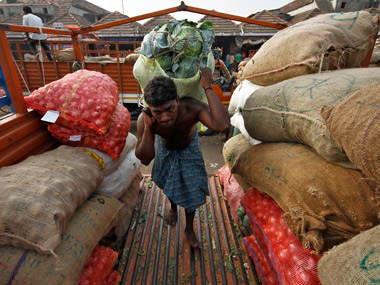Food inflation hits a 16-month low of negative 0.86 percent in October. This is one major component of the consumer price index (CPI)-inflation basket used by the Monetary Policy Committee (MPC) and the central bank tracks for policy formulation purposes. So, isn’t a sharp fall in CPI and food inflation good news? It is, indeed, good news for the urban consumer, who is now buying food items much cheaper than before but not, certainly, for the distressed rural farmer, who is still awaiting better price for his farm produce. The situation is particularly bad for debt-ridden small farmers with tiny landholdings. Overall, the consumer price index (CPI)-based retail inflation fell to a one-year low of 3.31 percent in October on the back of cheaper kitchen staples, fruits and protein-rich items. This is compared with 3.7 percent in September 2018 and 3.58 percent in October 2017. The retail inflation number is the lowest since September 2017 when it touched 3.28 percent. Separately, October WPI numbers showed a rise to a four-month high of 5.28 percent from 5.13 percent in September and 3.68 percent in October last year. This is in contrast to the CPI numbers but here too, there is a common factor—food articles have witnessed softening of prices with deflation at 1.49 percent in October, against 0.21 percent in September. Vegetables became cheaper with deflation at 18.65 percent in October, compared to 3.83 percent in the previous month. [caption id=“attachment_4303427” align=“alignleft” width=“380”]  Representational image. Reuters[/caption] Importantly, these food inflation figures points to the problem in relying on the MSP (minimum support price) hikes to address farmer woes. The government promised MSP equal to at least 1.5 times of the A2+FL costs, but, clearly, this hasn’t worked on the ground yet to alleviate farm distress. “Such a trend (food inflation declining despite MSP hikes) goes against simple economics of MSP driving food inflation and the declining trend is showing that there has been very little procurement happening on the ground. This is indeed a matter of serious concern, ” Soumya Kanti Ghosh, group chief economic adviser at State Bank of India, said in a report. Ironically, the fear initially was that a higher MSP will lead to higher inflation. But, in reality, the trend has turned out to be disinflation in food prices. This either means farmers are selling below the MSP or procurement is not happening at all on the ground. Research studies tell us that except in a few states like Punjab, Haryana and Andhra Pradesh, farmers haven’t benefitted from the MSP. Here too, major procurement is happening only in rice and wheat. MSP and crop insurance are the two key themes this government has adopted to address in the farmer stress issue. But, why haven’t these worked well to alleviate the problems of the farmer? According to a veteran banker who has worked in the agriculture segment for a few decades, the MSP often fails to do the job, except in the case of wheat and rice, because farmers don’t have the means to take their produce to the designated markets to claim the price. In some cases, market prices are higher than the MSP. At a larger level, the farm sector is in desperate need of structural reforms. Indian farmers have the smallest landholdings globally and a very small percentage of the land benefits from irrigation facilities. The global average of landholding size is 5.5 hectares. The per capita availability of land in India, from 1951 to 2011 declined by 70 percent from 0.5 hectares to 0.15 hectares. Now, what is the problem with holding smaller pieces of land? It makes the life of the farmer a lot tougher as his costs escalate on all counts —equipment, labour and crop treatment. Unlike rich farmers who own several hectares of land, the poor farmers will not have enough appeal among bankers as well. Also, there are several other factors that have fueled the agrarian distress — demonetisation triggered a cash crunch and put a freeze on informal and rural economies for several months on end; higher costs of production; a lack of a competitive pricing mechanism; and the slow pace of migration from the conventional APMC system to technology-based E-mandis. For now, from the latest inflation figures, the message to the policymakers is that agriculture distress can’t be cured by MSP/crop insurance alone. The problem is much deeper. A sharp decline in food inflation figures is a warning signal. -- With data support from Kishor Kadam
The situation is particularly bad for debt-ridden small farmers with tiny landholdings.
Advertisement
End of Article


)

)
)
)
)
)
)
)
)



